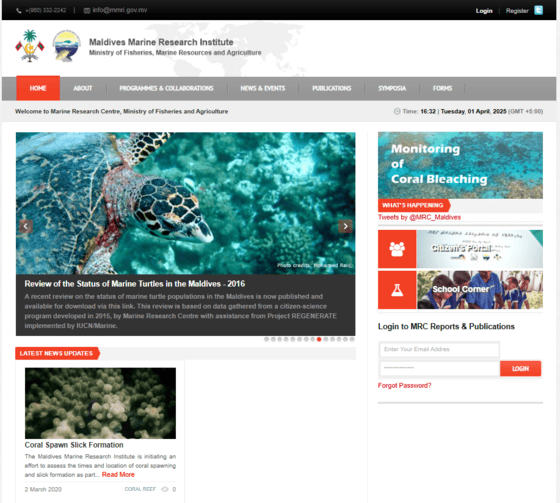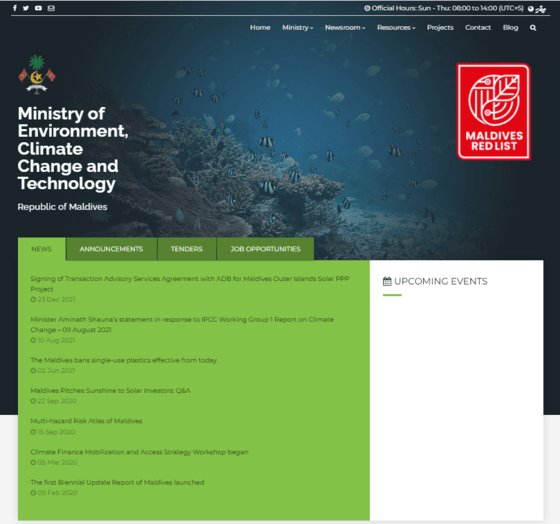Archiving an Island Nation: The Maldives Government Web Archive
In this interview, Charlotte Giles discusses the Maldives Government Web Archive — how it was created, what it preserves, and why it is an important addition to the Library’s Asian Division. She shares examples of how the archive captures the unique perspective of an island nation and explains why collecting materials from the Maldives is important but also challenging. This is part of a series highlighting new collections in the Library’s web archives and the behind-the-scenes work that goes into creating them.
Tracee: First, let’s introduce you to the readers. What is your job at the Library of Congress, and what was your role in creating the Maldives Government Web Archive?
Charlotte: My name is Charlotte Giles and I am a South Asia reference specialist in the Asian Reading Room covering Bangladesh, Pakistan, and the Maldives. I started the Maldives Government Web Archive in Fall 2021 and continue to maintain it by checking the quality of the archived websites and adding new websites to the collection.
Tracee: Can you briefly describe the collection?
Charlotte: The Maldives Government Web Archives contains Maldives government websites at the national level, including sites such as those for the President’s Office and other ministries like the Ministry of Arts Culture and Heritage. Most of these websites are in Dhivehi (or Divehi) and English. In the future, I’d like to expand the collection to include government sites from the atolls. There are 22 natural atolls and 20 administrative units covering the approximately 1,200 islands that comprise the Maldives. Crawling these websites will allow us to capture information about how each unit responds to the unique challenges and needs of the individual atolls.
Tracee: How did you select material to archive? Did you have any specific goals or considerations in mind when nominating content?
Charlotte: My first step was to research the overall structure of the Maldives government. Maldives is an island nation. As an archipelagic state (meaning, a country that contains one or more archipelagos) there are certain industries that reflect the specific needs of this reality. The scope of the collection is relatively straight forward. I selected all national government pages. My intention is to show the breadth of ministries making up the government. It didn’t make sense to leave anything out of the collection.
I waited to add sites for the individual atolls for two reasons. The first was to see the quality of the captures of national sites. The second was that the national government sites were, and still are, in a state of flux. The government appears to be in the process of updating their pages and rearranging some of the ministries. It was important to attempt to keep up with these changes instead of focusing on adding new sites.

Tracee: What are some of the highlights?
Charlotte: Ministries and other affiliated offices that make up any government point to not just its day-to-day machinations, but also a country’s particular needs based on a variety of factors. Two sites in this archive reflect the unique environmental and geographic challenges: the Ministry of Tourism and the Environment (previously the Ministry of Environment, Climate Change, and Technology) and the Maldives Marine Research Institute. Along with the Ministry of Fisheries and Ocean Resources (which we are currently crawling and will be added to this collection soon), these offices are responsible for the research and implementation of policies meant to protect the fragile ecosystems that make up and surround the over 1,000 island nation. The Maldives Marine Research Institute describes itself as “the research arm of the Ministry of Fisheries and Ocean Resources” (previously the Ministry of Fisheries, Marine Resources and Agriculture). The latter is responsible for ensuring sustainable fishing and agricultural practices supported by the research of the MMRI. The two ministries work with the research arm to ensure that policies reflect the science. New sites in the collection will include local international partner organizations focused on South Asia, the Indian Ocean, and the Bay of Bengal. Examples include the South Asia Regional Energy Partnership (SAREP), UNESCO, and The Bay of Bengal Programme Inter-Governmental Organisation.
Tracee: What challenges have you faced in creating this collection?
Charlotte: The greatest challenge has been tracking down all of the various ministries and their affiliate websites. As I was gathering the initial group of sites, the government had recently shifted to a new site that seemed to hold all information about the various ministries. There continues to be some reorganization and renaming of ministries. For example, the Ministry of Environment, Climate Change, and Technology has been renamed to the Ministry of Environment, Climate Change, and Energy. The means that I will need to conduct frequent checks to keep up with any potential changes in names or URLs.
A second challenge has been language. Some of the sites are only in Dhivehi, which made locating them a bit difficult. In some cases, I discovered additional ministries and offices and updated URLs through affiliated social media accounts.
A third challenge has been the process of getting the appropriate permissions to make the collection more accessible to researchers on loc.gov. Some websites are restricted to onsite access because we did not receive a response from website owners.

Tracee: Why do you think web archiving is important for documenting this subject? How do you imagine researchers, now or in the future, might use this web archive?
Charlotte: Collecting physical materials from the Maldives (books, newspapers, magazines, etc.) is not a simple task. The Library needs a point of contact in the country who is familiar with and has experience working in the publishing industry. This contact works with the Library of Congress’ overseas office in New Delhi. Once those items arrive in New Delhi, they must be cataloged by a librarian who is fluent in English and Dhivehi (if that is the language of the item). Given the small population of Dhivehi speakers in the world (approximately 500,000 according to Ethnologue, approximately 490,000 in the Maldives proper), hiring a librarian fluent in English and Dhivehi in Delhi who can be trained to catalog according to the Library of Congress standards is extremely difficult.
All of these factors, in addition to the relatively small publishing industry, contribute to a collection of materials that is small relative to the number of materials available at the Library of Congress from other Asian countries. The Library Catalog lists just over 800 records from Maldives, with around 200 items in Dhivehi. Due to the forces of climate change and the shrinking landmass of the country, every physical and digital resource we collect is precious.
International government publications are an important part of the Library of Congress collections. Given that much of this material is being published online on official government websites, the crawling of these websites is more important than ever. The Maldives Government Web Archive allows current and future researchers insight into the organization and running of the country. Many of these sites are in both Dhivehi and English, contributing the available Dhivehi resources at the Library.
Given the drastic effects of climate change throughout the world, but most especially for island nations, this web archive will document one such place whose very existence is at risk.
Source of Article